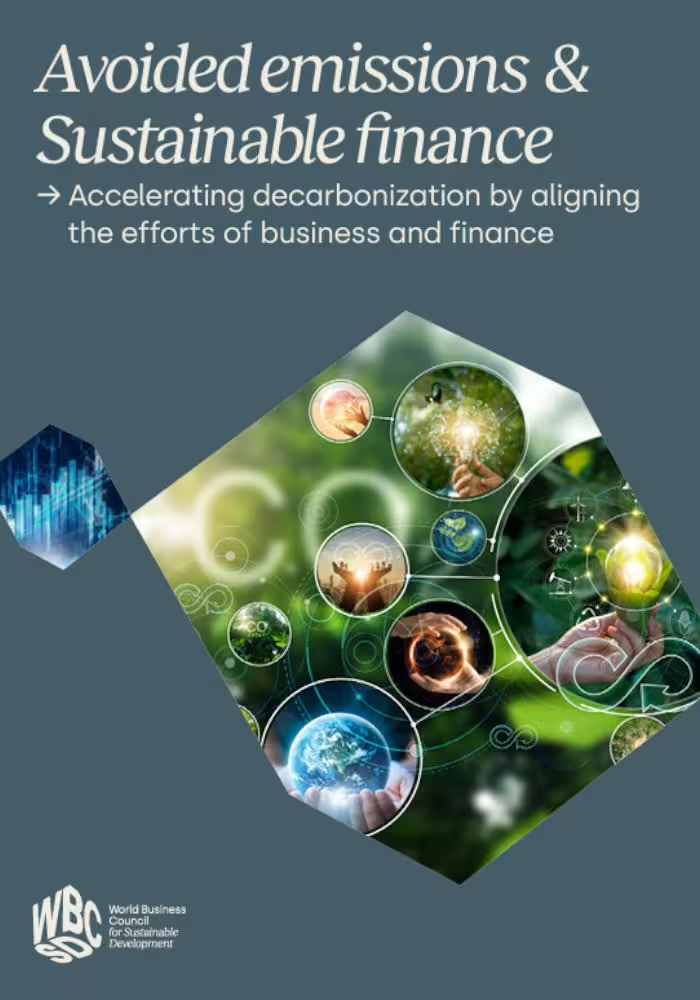Accelerating decarbonization by aligning the efforts of business and finance
Published: June 12, 2024

Dominant greenhouse gas (GHG) accounting frameworks such as GHG Protocol, CDP and TCFD lay out the foundation for emissions measurement, disclosure and reduction by business and financial institutions. These frameworks focus on quantifying and reducing generated or financed emissions following an inventory accounting approach. Despite increased efforts by private market actors, humanity remains off track to limit global warming to 1.5°C above pre-industrial levels. While reduction-led strategies are ctitical, they must be complemented by opportunity-led perspectives and growth narratives.
To achieve meaningful impact, we must implement resilient climate solutions at scale, particularly in markets with high decarbonization potential. Assessing the potential of these solutions and creating effective incentives for their adoption is challenging. Robust, context-specific methodologies and alignment across business and financial sectors are essential to mobilize resources for transformational efforts.
The concept of avoided emissions can unite business and finance together in transformative pathways. It allows actors to adopt an intervention-based approach to climate action based on the measurement and comparison of systemic GHG impacts. Financial actors increasingly adopt avoided emissions and intervention-based GHG accounting to invest in future-proof sustainability solutions.
WBCSD teamed up with leading financial actors GFANZ, PCAF, Circularity Capital, and GX League to develop this insight paper and strengthen the links between avoided emissions and transition finance. The project was supported by Deloitte. In this practitioner-focused insight paper, we explore the links between select corporate finance asset classes and avoided emissions use cases. The paper aims to
- Demonstrate the added value of avoided emissions perspectives in the context of sustainable finance and net-zero emissions trajectories
- Provide practical guidance on how companies and investors can leverage avoided emissions perspectives across asset classes
- Discuss good practices and current challenges in avoided emissions assessments, attribution and reporting for companies and financial institutions
- Lay out of the current regulatory and (voluntary) standards landscape for financial actors and companies in the avoided emissions context.
The GX League Working Group on Disclosure and Evaluation of Climate-related Opportunities engages over 90 financial institutions and corporations in exploring climate change-related business opportunities. The Working Group has formulated Basic Guidelines for corporate opportunities in response to climate change and has published Financial Institution Case Studies and Hypothetical Cases on avoided emissions disclosure.
The Working Group welcomes the release of this Insight Paper. Avoided Emissions play a pivotal role in assessing corporate contributions to GHG reduction efforts, showcasing a company’s prowess in addressing challenges. We are committed to continue collaborating with WBCSD to advance the use of avoided emissions in climate change mitigation efforts.
– GX League Working Group on Disclosure and Evaluation of Climate-related Opportunities
We believe that developing a robust framework for avoided emissions reporting is key to maximise positive environmental impact and institutional investor capital flows. It’s for this reason that we are delighted to have supported WBCSD in developing this guidance for private markets investors. This report comes at a crucial time in the maturity of the global impact investment industry.
– Jamie Butterworth, Partner, Circularity Capital
The WBCSD paper advances the conversation on quantifying avoided emissions, moving us closer to developing methods specific to financial portofolios. PCAF was delighted to contribute to this paper and will leverage new insight into future updates to the Global GHG Accounting and Reporting Standard for the Financial Industry.
– Caspar Noach, Technical Director of PCAF